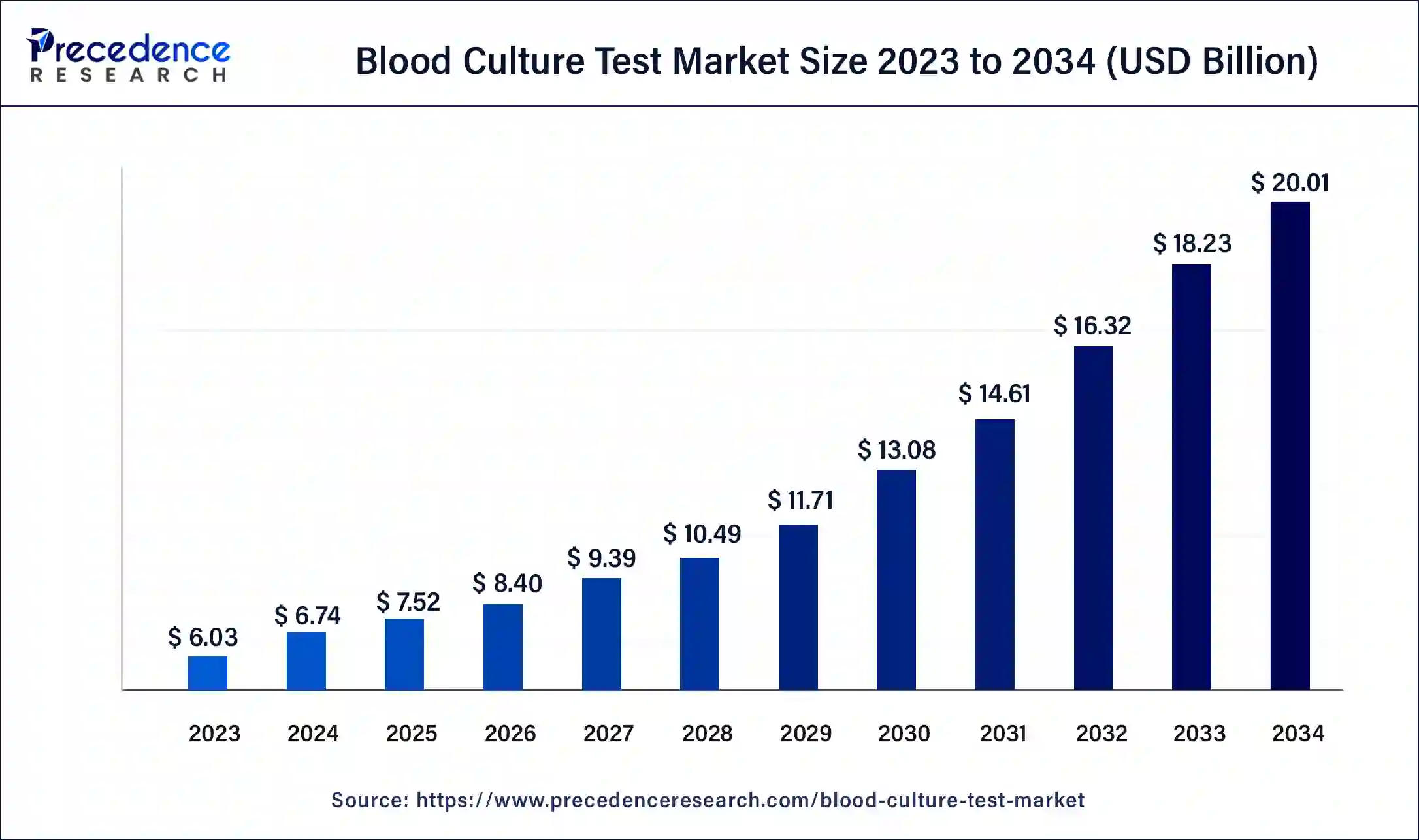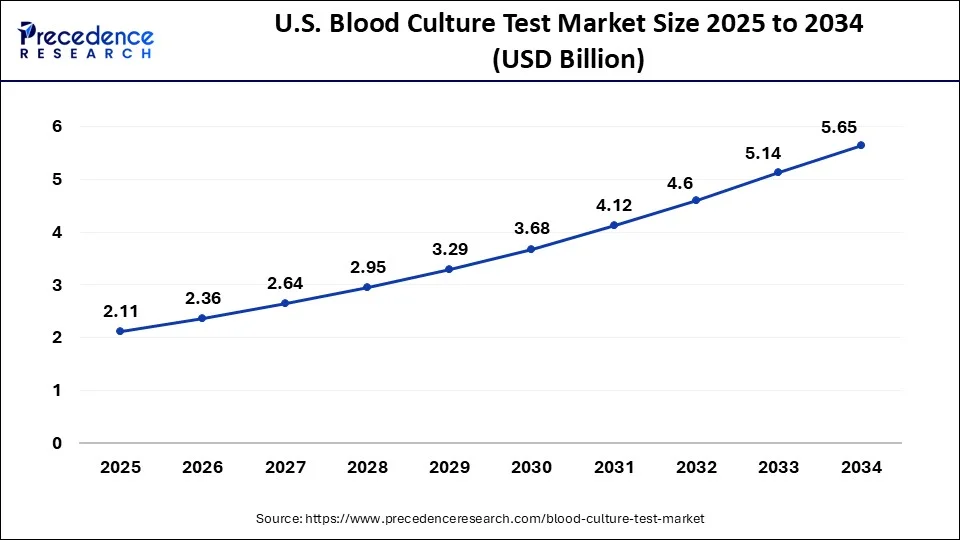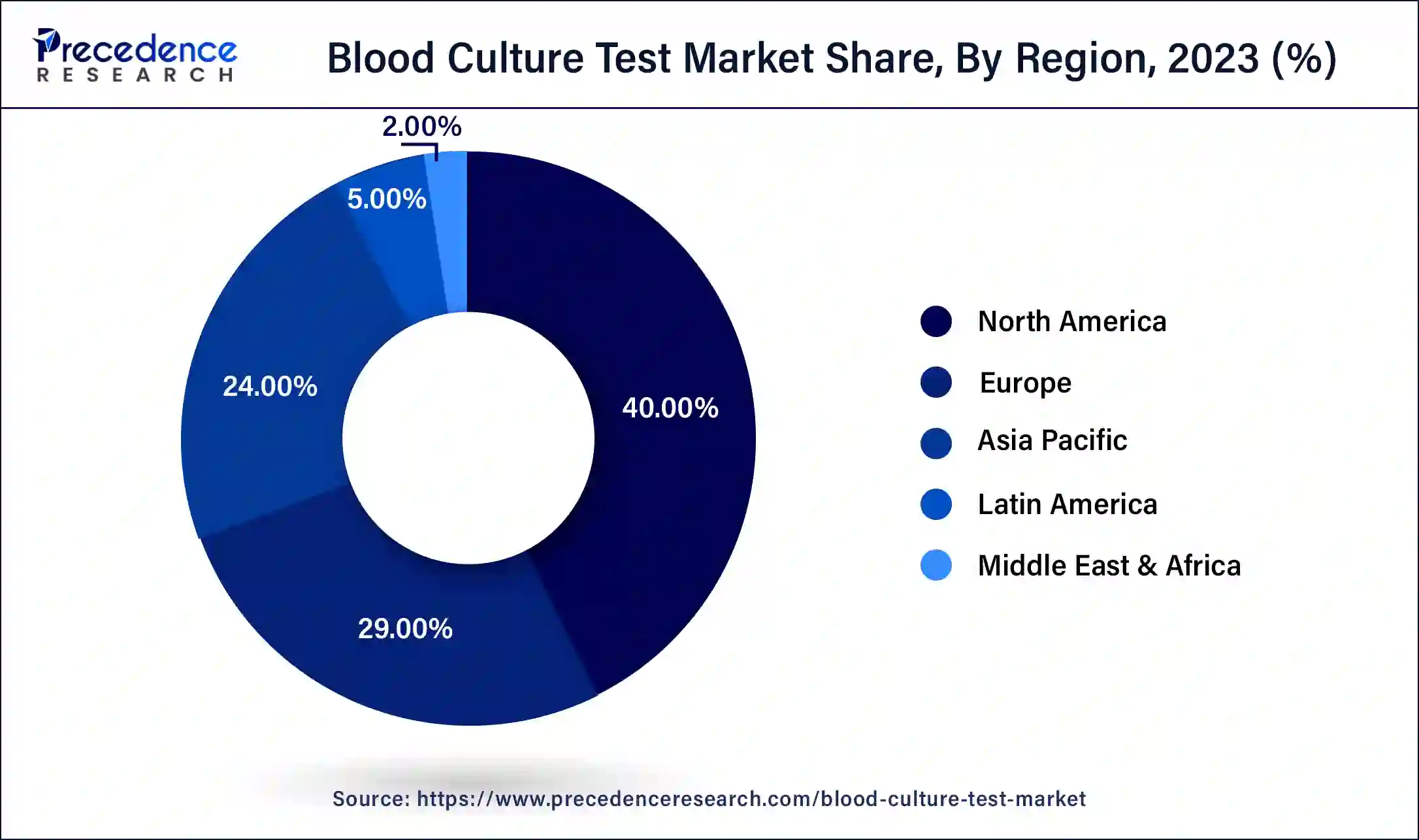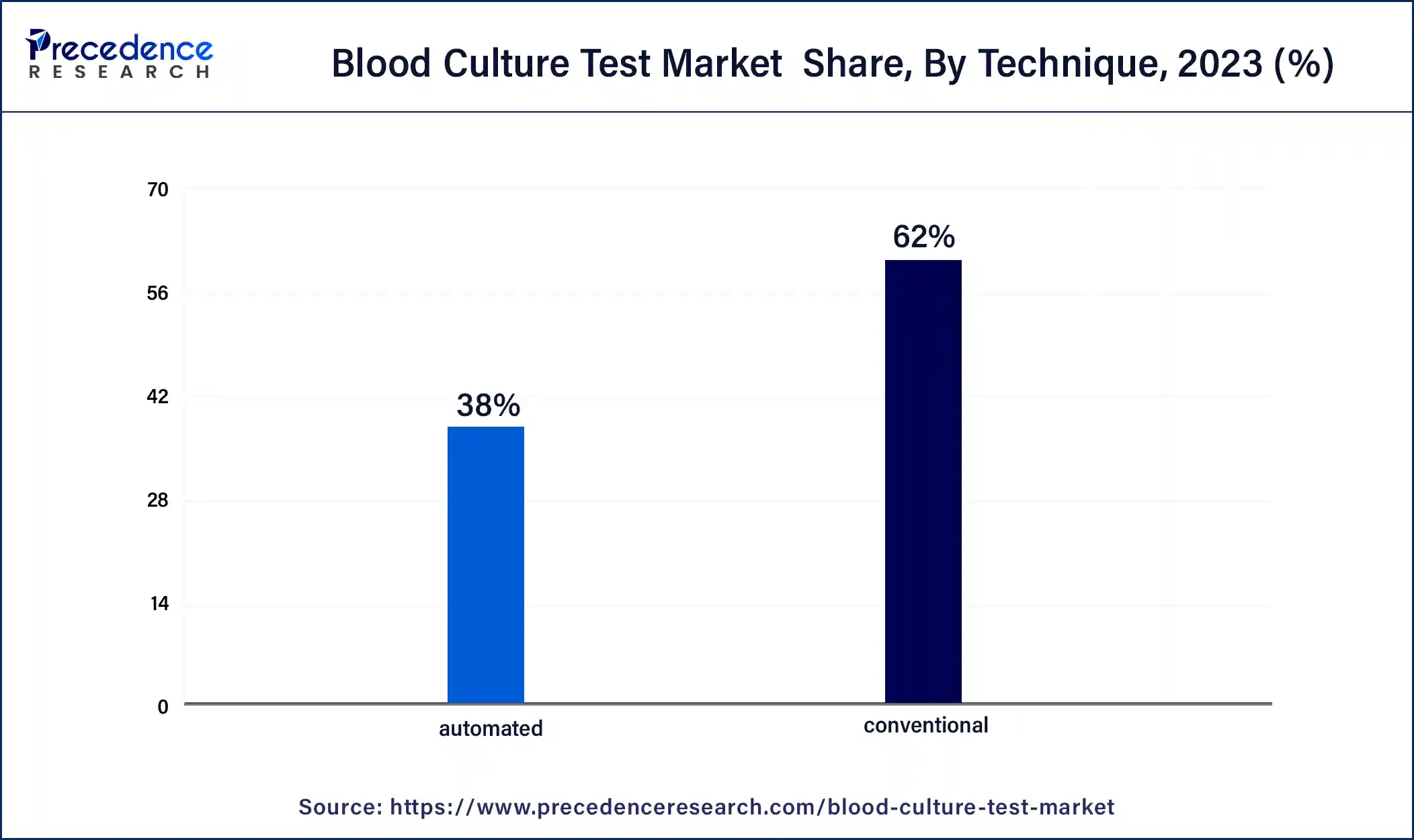April 2025
The global blood culture test market size was USD 6.03 billion in 2023, estimated at USD 6.74 billion in 2024 and is anticipated to reach around USD 20.01 billion by 2034, expanding at a CAGR of 11.49% from 2024 to 2034.
The global blood culture test market size accounted for USD 6.74 billion in 2024 and is predicted to reach around USD 20.01 billion by 2034, growing at a CAGR of 11.49% from 2024 to 2034.

The U.S. blood culture test market size was valued at USD 1.69 billion in 2023 and is expected to reach USD 5.65 billion by 2034, at a CAGR of 11.58% from 2024 to 2034.

North America has held the largest revenue share of 40% in 2023. North America dominates the blood culture test market due to advanced healthcare infrastructure, extensive research and development activities, and high healthcare expenditure in the region. The presence of key market players, robust regulatory frameworks, and a proactive approach to infectious disease management contribute to the region's significant market share. Additionally, a rising awareness of the importance of early disease detection and a strong emphasis on healthcare quality and safety further drives the adoption of blood culture tests in North America.

Asia-Pacific is estimated to observe the fastest expansion. Asia-Pacific holds a significant share in the blood culture test market due to the region's large and diverse population, increasing prevalence of infectious diseases, and rising healthcare expenditure. The growing awareness of the importance of early disease detection, along with advancements in healthcare infrastructure, contributes to the increased adoption of blood culture tests. Additionally, collaborations between key market players and government initiatives to improve healthcare access further drive the market's expansion in the Asia-Pacific region.
Blood Culture Test Market Overview
A blood culture test is a medical examination designed to identify harmful microorganisms, such as bacteria or fungi, in the bloodstream. This procedure involves extracting a small sample of blood and placing it in a sterile environment conducive to the growth of these microorganisms. By facilitating their growth, the test aids in pinpointing potential infections within the bloodstream, particularly those with the potential to cause serious conditions like sepsis.
Physicians typically order blood culture tests when patients exhibit symptoms of severe infections, like high fever, chills, or low blood pressure. The results of these tests are crucial in guiding healthcare providers to prescribe targeted antimicrobial treatments tailored to combat the specific pathogens causing the infection. Swift and accurate identification of these causative agents is imperative for effective patient care, allowing for timely and precise interventions to curb the spread of infections and enhance overall patient recovery.
| Report Coverage | Details |
| Growth Rate from 2024 to 2034 | CAGR of 11.49% |
| Market Size in 2023 | USD 6.03 Billion |
| Market Size in 2024 | USD 6.74 Billion |
| Market Size by 2034 | USD 20.01 Billion |
| Largest Market | North America |
| Base Year | 2023 |
| Forecast Period | 2024 to 2034 |
| Segments Covered | Product, Technique, Application, Technology, and Region |
| Regions Covered | North America, Europe, Asia-Pacific, Latin America, and Middle East & Africa |
Global spread of antimicrobial resistance and focus on early disease detection
The global spread of antimicrobial resistance (AMR) significantly amplifies the demand for blood culture tests. As pathogens become more resistant to traditional antibiotics, precise identification of the infecting microorganism becomes paramount. Blood culture tests play a pivotal role in determining the specific pathogens causing infections, aiding healthcare professionals in prescribing targeted and effective antibiotic treatments. This necessity is underscored by the urgency to combat the increasing threat of treatment-resistant infections, driving the adoption of blood culture tests as a critical diagnostic tool in the era of rising AMR.
Simultaneously, the focus on early disease detection fuels the demand for blood culture tests. Timely identification of infectious diseases, including sepsis, is crucial for initiating prompt and appropriate interventions. Blood culture tests enable healthcare providers to swiftly diagnose infections, supporting early disease detection initiatives. The emphasis on early intervention aligns with broader healthcare goals of improving patient outcomes and reducing the overall burden of infectious diseases, making blood culture tests indispensable in the landscape of proactive and preventative healthcare strategies.
Complexity of testing procedures and turnaround time
The complexity of blood culture testing procedures poses a restraint on market demand. These tests often involve intricate laboratory protocols, requiring skilled personnel and specialized training. The complexity may result in a shortage of qualified professionals, hindering routine use in healthcare facilities. This challenge is particularly pronounced in regions with limited access to well-trained laboratory staff, impacting the overall adoption of blood culture tests.
Additionally, the extended turnaround time associated with some blood culture tests acts as a significant restraint. Despite technological advancements, certain tests still require substantial processing time, delaying the delivery of critical diagnostic information. In scenarios where swift clinical decisions are imperative, such delays may lead to suboptimal patient outcomes. The market demand for blood culture tests is thus influenced by the need for continuous efforts to streamline testing procedures, reduce complexity, and enhance the speed of obtaining reliable results.
Advancements in technology and point-of-care testing (POCT)
Advancements in technology and the evolution of point-of-care testing (POCT) are pivotal in creating opportunities within the blood culture test market. Technological innovations, such as automated systems and improved detection methods, enhance the precision and efficiency of blood culture tests. The integration of molecular diagnostics and novel detection technologies allows for faster and more accurate identification of pathogens, addressing historical challenges associated with complex testing procedures. Furthermore, the rise of point-of-care testing is transforming the landscape by offering immediate, on-site diagnostic results.
POCT enables healthcare professionals to perform blood culture tests at the bedside, eliminating the need for centralized laboratories and significantly reducing turnaround times. This paradigm shift enhances accessibility, particularly in remote or resource-limited settings, and facilitates prompt clinical decision-making. The convergence of technological advancements and the expansion of point-of-care testing creates a synergistic opportunity, fostering the development of more efficient and accessible blood culture testing solutions to meet evolving healthcare demands.
In 2023, the consumables segment had the highest market share of 59% based on the product. In the blood culture test market, the consumables segment encompasses the essential materials used in testing processes, including culture media, vials, and blood culture bottles. Trends in this segment focus on the development of advanced culture media formulations, offering improved sensitivity and quicker detection of pathogens. Additionally, manufacturers are working towards the integration of innovative materials in blood culture bottles, enhancing the overall efficiency of the testing process. These trends emphasize the continuous refinement of consumables to optimize blood culture tests for more accurate and timely diagnostic outcomes.
The instruments segment is anticipated to expand at a significant CAGR of 12.5% during the projected period. In the blood culture test market, the "instruments" category refers to the tools utilized for processing and analyzing blood samples to identify microbial infections. This includes automated blood culture systems, incubators, and detection devices. A notable trend involves incorporating advanced technologies like continuous monitoring and real-time data analysis into these instruments, aiming to improve the efficiency and accuracy of results. The market is witnessing a demand for user-friendly, efficient, and cost-effective instruments, leading to the development of next-gen systems that enhance diagnostic capabilities in detecting infectious pathogens.
According to the technique, the conventional segment has held 62% revenue share in 2023. In the blood culture test market, the conventional segment refers to traditional culturing techniques where blood samples are incubated in a culture medium to identify microbial growth. Despite ongoing technological advancements, conventional methods remain prevalent due to their established reliability. However, there is a growing trend towards faster and automated techniques, driven by the need for quicker results and reduced turnaround times. This shift reflects a broader industry push for efficiency and enhanced diagnostic capabilities in the rapidly evolving landscape of blood culture testing.

The automated segment is anticipated to expand fastest over the projected period. Automated blood culture testing utilizes advanced systems to streamline the identification of pathogens in blood samples, automating crucial steps like incubation and detection. This technique reduces manual effort, enhances efficiency, and is increasingly favored in the market. The trend reflects a growing preference for automated systems due to their capacity to deliver quicker and more accurate results. Automation not only minimizes the risk of contamination but also improves workflow in clinical laboratories. This is particularly crucial in addressing the demand for rapid and dependable diagnostics, especially in the context of sepsis and other bloodstream infections.
According to the application, the bacterial infections segment has held a 70% revenue share in 2023. The bacterial infections segment in the blood culture test market focuses on identifying and characterizing bacterial pathogens in the bloodstream. This application is critical for diagnosing various bacterial infections, including sepsis. A notable trend in this segment involves the development of rapid and automated blood culture systems that enhance the speed and accuracy of bacterial detection. Advances in technology and the quest for quicker results are driving innovation, making it more efficient for healthcare professionals to diagnose and treat bacterial infections promptly, improving patient outcomes.
The mycobacterial infections segment is anticipated to expand fastest over the projected period. The mycobacterial infections segment in the blood culture test market focuses on detecting microorganisms belonging to the mycobacterium genus, including mycobacterium tuberculosis. Trends indicate a rising demand for blood culture tests to diagnose tuberculosis and other mycobacterial infections promptly. With advancements in testing technologies, there's a growing emphasis on improving the sensitivity and specificity of these tests. The mycobacterial infections segment reflects the market's commitment to addressing the global burden of tuberculosis and other mycobacterial diseases through enhanced diagnostic accuracy and timely intervention.
According to the technology, the culture-based technology segment has held a 67% revenue share in 2023. In blood culture testing, culture-based technology involves isolating and cultivating microorganisms from a patient's blood sample to identify potential infections. Traditional culture methods rely on the growth of bacteria or fungi in a controlled environment. Recent trends in culture-based technology for blood culture tests include increased automation, reducing turnaround times. Additionally, advancements in molecular diagnostics within culture-based methods enhance sensitivity and specificity, allowing for more precise identification of pathogens. These trends contribute to improved diagnostic accuracy and efficiency in identifying bloodstream infections.
The proteomic technology segment is anticipated to expand fastest over the projected period. Proteomic technology in the blood culture test market involves the study of proteins expressed by microorganisms in blood samples. It identifies and analyzes unique protein profiles to pinpoint specific pathogens. Trends in this segment include the integration of mass spectrometry and advanced bioinformatics, enabling rapid and precise pathogen identification. Additionally, the adoption of proteomic technology facilitates the development of personalized antibiotic treatments, contributing to more effective infection management and a growing focus on precision medicine within the blood culture test market.
Segments Covered in the Report
By Product
By Technique
By Application
By Technology
By Geography
For inquiries regarding discounts, bulk purchases, or customization requests, please contact us at sales@precedenceresearch.com
No cookie-cutter, only authentic analysis – take the 1st step to become a Precedence Research client
April 2025
January 2025
August 2024
March 2024